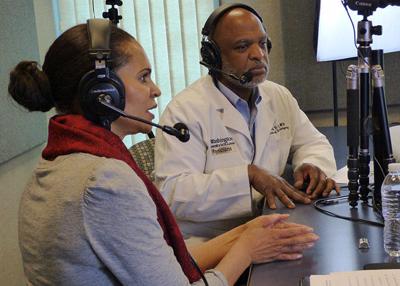Prostate cancer can affect men of any race, but African-American men are at greater risk of having the disease, and of getting it at a younger age.
Knowing this, Dr. Lannis Hall and Dr. Arnold Bullock of Siteman Cancer Center and their colleagues at the Prostate Cancer Coalition are working to educate men, including through a radio show and podcast, and to challenge them to take control of their prostate health.
They created the “Our Healthy Men” radio show, presented in conjunction with RareGem Productions, to reduce fear and battle misconceptions about preventing and treating the disease.
“We want men to lead healthier, happier lives,” said Dr. Hall, a Siteman Cancer Center radiation oncologist. “Through the radio show we provide essential, life-saving information that moves men to improve their health and the health of their loved ones.”
“Our Healthy Men” is available on iHeartRadio and iTunes, as well as on the websites of Siteman, siteman.wustl.edu, and the Prostate Cancer Coalition, prostatecancercoalitionstl.org.
Prostate cancer is the most common non-skin cancer in men, and getting screened is critical, Dr. Hall said. The PSA test, evaluated extensively by Washington University physicians at Siteman Cancer Center, is one such screening method. The blood test measures the level of PSA, or prostate-specific antigen. Elevated levels are associated with the potential presence of cancer in the prostate. While PSA is specific to the prostate and not cancer itself, the test is a critical first step in determining one’s health.
The Prostate Cancer Coalition and the American Cancer Society advocate that African-American men and those with a family history of prostate cancer get screened regularly – every one or two years, depending on PSA test results – starting at the age of 45.
Dr. Hall recognizes that cancer can be a scary subject but emphasizes that, if prostate cancer is discovered before it spreads, the survival rate is nearly 100 percent.
“I strongly recommend that men make an appointment with their doctor before their 45th birthday to get a PSA screening,” she said. “It’s not the most exciting birthday gift, but it could be the one that saves your life.”
Treatment, a topic of the “Our Healthy Men” program and podcast, can vary depending on how soon it is diagnosed. Options include radiation therapy, surgery and chemotherapy, or a combination thereof. In some cases, active surveillance, when a physician monitors but doesn’t remove the slow-growing cancer, is an appropriate management strategy.
According to Dr. William L. Dahut, scientific director for clinical research at the National Cancer Institute’s Center for Clinical Research, it has been found that when participating in clinical trials, African-American men do very well, if not better, than their Caucasian counterparts. For Dr. Dahut and Dr. Hall, this is significant information for those diagnosed with prostate cancer.
“Being involved in clinical trials is particularly important for African-American men,” said Dr. Dahut. “I would encourage them to talk to their doctors about participating in clinical trials, as these trials are crucial to advancing medical research.”
According to Dr. Hall, only 30 to 40 percent of men have gotten PSA testing even though the blood test is one of the easiest tests to administer. Due to PSA testing the mortality rate has decreased and patient outcomes have improved, she said.
“The significant reduction in mortality from prostate cancer indicates the importance of getting men screened, treated and on clinical trials to find the best therapies for all men,” said Dr. Hall.
Educating men about why they should be screened and reminding them to make an appointment are what make the “Our Healthy Men” radio show and podcast an important effort.
“This is an important educational program to provide necessary information to our community about prostate health, prostate cancer and the various treatment options,” Dr. Hall said. “The importance of participating in clinical trials is paramount. When high-risk men are treated in a timely fashion, outcomes are excellent and many side effects can be minimized.”
To learn more about prostate cancer screening and cancer, visit siteman.wustl.edu or prostatecancercoalitionstl.org. The “Our Healthy Men” radio show is also available on the websites and on the iHeartRadio app and iTunes.













(0) comments
Welcome to the discussion.
Log In
Keep it Clean. Please avoid obscene, vulgar, lewd, racist or sexually-oriented language.
PLEASE TURN OFF YOUR CAPS LOCK.
Don't Threaten. Threats of harming another person will not be tolerated.
Be Truthful. Don't knowingly lie about anyone or anything.
Be Nice. No racism, sexism or any sort of -ism that is degrading to another person.
Be Proactive. Use the 'Report' link on each comment to let us know of abusive posts.
Share with Us. We'd love to hear eyewitness accounts, the history behind an article.